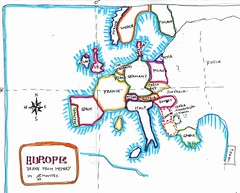
De strijd van Marianne Fischer tegen de zieke wijnsubsidie gaat goed. In december was haar nieuwe maatregel in de EU al erdoor, nu hebben ook de regeringen van de EU landen de maatregel bekrachtigd…
The Council of Ministers has
formally adopted a wide-reaching reform of the EU wine sector intended
to encourage the most inefficient European wine producers to abandon
production and to help the sector face up to increasingly tough
competition from ‘new world' wines.
EU ministers rubber-stamped the agreement on 29 April, four months
after EU agriculture ministers reached a political agreement on the
deal at their council on December 2007.
A key element of the reform package are vineyard ‘grubbing-up'
premiums, which will be paid to all wine producers who decide to leave
the sector on a voluntary basis – those who are the least efficient are
likely to take advantage of the plan. The scheme will last for three
years and apply to a maximum of 175,000 hectares of vineyard in the EU.
Another plan is to remove some EU-funded market support to the
sector by scrapping the ‘crisis distillation' scheme. Each year
thousands of litres of unwanted wine are turned into industrial
ethanol, a system that soaks up two-fifths of the EU's €1.269 billion
annual wine budget. The reform will see the end of crisis-distillation
spending in 2012.
Under the plans, national governments will be allocated a sum of
money to spend on their wine sectors, but spending choices will be
limited to a number of measures that the Commission believes will
result in an overhaul of the sector. Money can be spent on promoting EU
wines abroad, on modernising the production chain and on other
measures, including harvest-insurance plans.
At the December 2007 farm council, ministers also agreed to reduce
the amount of sugar that wine producers can use to fortify their wines.
The Commission had wanted to see a complete ban on the use of sugar,
which is used mainly in northern European countries, as a way of
balancing out an end to the subsidies the EU pays to southern European
countries, which use grape must to enrich wine. In the final deal,
levels of both sugar and subsidies were cut, rather than scrapped.
The EU's share of the world wine trade has been declining over the
last decade. At the same time surplus production has been growing, two
trends that prompted Mariann Fischer Boel, the EU's farm commissioner,
to call for the reform. A Commission impact assessment published in May
2007 said that, without the reform, the annual EU wine surplus could
reach as high as 13.9% of production.
Moreover, in 2007 the global market share occupied by EU wines stood
at 62%, down from an average of 79% between 1986 and 1990, when EU
wines where at their most popular, the Organisation International de la
Vigne et du Vin wrote in report published on 28 March. During a similar
time frame, the market share has grown for ‘new world' wines, from
countries including Chile, the United States, Australia and Argentina.
“The reform will allow us to concentrate on taking on our
competitors and winning back market share,” Fischer Boel said on 29
April.
The reform will now come into force on 1 August.
Bron: www.EuropeanVoice.com
Lees ook:EU schrijft tender uit voor de verkoop van wijnoverschotten
Lees ook:Wijnconsumptie in China stijgt met 70% per jaar
Lees ook:EU ministers zijn het oneens
Lees ook:Pernod Ricard doet aankopen in Roemenie
Lees ook:Het nieuwste nieuwe wereldland: India

Pay rate: What is minimum wage of a 17 year old
(per hour) in Australia working part-time…
?